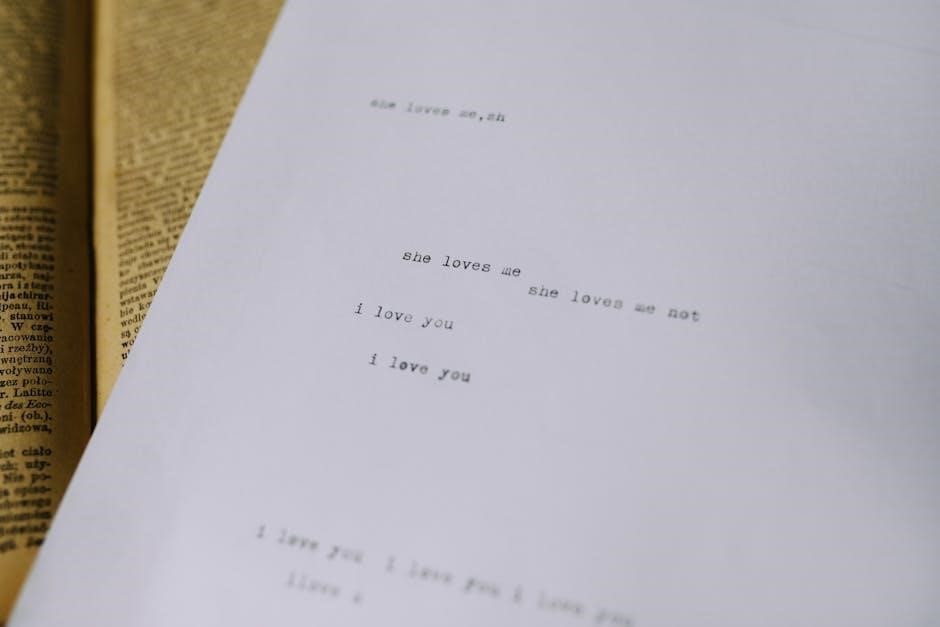Checking Out Me History poem by John Agard explores identity and history, using language and imagery to convey themes, available as a pdf online for readers to access and analyze the poem’s structure and meaning.
Overview of the Poem’s Theme
The poem’s theme is a crucial aspect of its overall meaning, and it is explored through the use of various literary devices, including imagery and language. The theme of identity is a dominant one, with the speaker seeking to understand their own history and culture. This is reflected in the lines “Dem tell me bout Lord Nelson and Waterloo / But dem never tell me bout Shaka de great Zulu”, which highlight the lack of representation of non-European cultures in traditional historical narratives. The poem also explores the idea of colonialism and its impact on individual identity, with the speaker seeking to reclaim their own history and challenge dominant narratives. The use of the motif of light in the poem adds depth to the theme, symbolizing knowledge and understanding. Overall, the poem’s theme is one of self-discovery and empowerment, encouraging readers to question traditional narratives and seek out their own truth. The poem is available as a pdf online, allowing readers to access and analyze its themes in more detail.

Analysis of the Poem’s Structure
The poem’s structure is free verse with irregular stanzas, using enjambment to convey emotions and ideas in a flowing manner online as a pdf.
Use of Language and Imagery in the Poem
The poem employs a range of language techniques, including metaphor, simile, and personification, to create vivid imagery and convey the speaker’s emotions. The use of language is often playful and inventive, with a focus on rhythm and sound. The poet’s use of imagery is particularly effective in evoking the history and culture of the speaker’s ancestors, with images of nature, music, and dance used to convey a sense of identity and belonging. The language is also often provocative and challenging, with the speaker questioning the dominant narratives of history and seeking to reclaim their own heritage. Through the use of language and imagery, the poem creates a sense of tension and conflict, as the speaker struggles to reconcile their past and present selves. The poem’s language and imagery are available to analyze in the pdf version online, allowing readers to explore the poet’s techniques in more depth. The use of language and imagery in the poem is a key aspect of its power and impact.

Exploring the Theme of Identity in the Poem
Identity is explored through cultural and historical contexts, shaping the speaker’s sense of self and belonging, as seen in the pdf version of the poem online always.
Comparison with Other Poems on Identity
Comparing Checking Out Me History to other poems on identity, such as those found in the Power and Conflict collection, reveals similarities in themes and motifs, including the use of language and imagery to convey the struggle for self-expression and cultural identity. The pdf version of the poem allows for easy comparison with other works, highlighting the unique perspective and voice of the speaker. Through this comparison, readers can gain a deeper understanding of the ways in which identity is shaped by historical and cultural contexts, and how poets use literary devices to explore and express these themes. The poem’s exploration of identity is also reflected in its use of symbolism and metaphor, which add depth and complexity to the narrative, and can be analyzed in detail through the pdf version of the poem. Overall, the comparison with other poems on identity highlights the significance of Checking Out Me History as a powerful exploration of self and culture.

Historical Context of the Poem
The poem’s context is rooted in colonialism and its effects on individual identity and culture through history.
Impact of Colonialism on Individual Identity
The impact of colonialism on individual identity is a significant theme in the poem, as it explores how colonialism has shaped the narrator’s understanding of themselves and their place in history. Through the use of language and imagery, the poem highlights the ways in which colonialism has erased or distorted the histories and cultures of marginalized communities. The narrator’s journey to reclaim their own history and identity is a powerful commentary on the lasting effects of colonialism. The poem suggests that colonialism has had a profound impact on individual identity, leading to a sense of disconnection and disorientation. By exploring this theme, the poem sheds light on the importance of reclaiming and preserving one’s own history and culture. The use of historical references and cultural allusions adds depth and complexity to the poem, making it a rich and thought-provoking exploration of the impact of colonialism on individual identity. Overall, the poem is a powerful exploration of the ways in which colonialism has shaped individual identity.
Techniques Used by the Poet to Convey Ideas
The poet uses imagery and metaphor to convey ideas and explore themes in the poem with effective language and style always.
Effect of the Poem’s Techniques on the Reader
The effect of the poem’s techniques on the reader is to create a sense of empathy and understanding, through the use of language and imagery that evokes emotions and challenges perspectives. The poet’s use of metaphor and symbolism adds depth and complexity to the poem, making it more engaging and thought-provoking for the reader. The techniques used in the poem also help to convey the poet’s message and themes, such as identity and history, in a way that is both powerful and accessible. By using a range of literary devices, the poet is able to create a rich and nuanced poem that resonates with readers and encourages them to think critically about the issues presented. The overall effect is to leave the reader with a lasting impression and a deeper understanding of the poem’s themes and messages, as explored in the pdf version of the poem. The poem’s techniques have a profound impact on the reader’s interpretation and analysis of the poem.

Quote Analysis from the Poem
Analysis of quotes like “Dem tell me” in the pdf version reveals the poet’s use of language to convey themes and ideas about identity and history.
Significance of the Final Lines of the Poem
The final lines of the poem, available in the pdf version, hold great significance as they summarize the speaker’s journey of self-discovery and identity formation. The lines “But now I checking out me own history I carving out me identity” suggest that the speaker has taken control of their own narrative, rejecting the imposed history and instead opting to explore and learn about their own heritage. This is a powerful statement of empowerment and self-awareness, highlighting the importance of individual agency in shaping one’s own identity. The use of the phrase “carving out me identity” implies a sense of autonomy and self-determination, emphasizing the speaker’s desire to create their own sense of self, free from the influences of colonialism and external forces. The final lines of the poem serve as a call to action, encouraging readers to take ownership of their own histories and identities. The poem’s message is one of hope and resilience, and the final lines drive home the significance of this message. The language used is simple yet effective, making the poem accessible to a wide range of readers.
of the Poem’s Significance
The poem’s significance lies in its ability to spark critical thinking and reflection on the importance of identity and history, as evident in the pdf version. The speaker’s journey serves as a powerful reminder of the need to challenge dominant narratives and seek out diverse perspectives. Through its exploration of themes such as colonialism, identity, and empowerment, the poem encourages readers to think critically about the world around them. The poem’s message is one of hope and resilience, emphasizing the importance of individual agency in shaping one’s own identity. The language used is simple yet effective, making the poem accessible to a wide range of readers. Overall, the poem is a significant work that challenges readers to think critically about the world and their place in it, and its message continues to resonate with readers today, as seen in the online pdf versions and analyses. The poem’s significance is a testament to the power of poetry to inspire and educate, and its impact will be felt for years to come, making it a valuable resource for scholars and readers alike.
